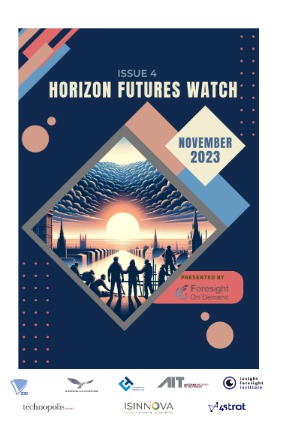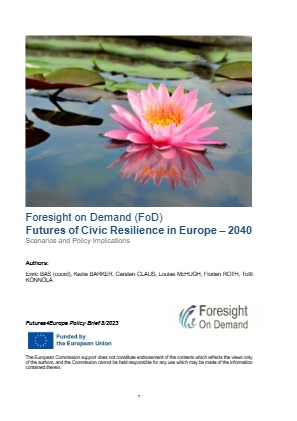The 8th Horizon Futures Watch Dissemination Workshop, which took place on 22 November 2023, served as a platform for insightful discussions centred around the topic of the future of civic resilience.
Participants delved into reflections acknowledging the emergence of resilience as a prominent topic during financial crises, particularly for establishing a resilient financial system. This focus gained substantial momentum in the aftermath of the Covid-19 pandemic, where publications began framing resilience as a new compass for EU policy, underscoring the imperative to navigate challenges and transitions in a sustainable, fair, and democratic manner. At the heart of the discussions was the exploration of the genuine meaning of the notion of "resilience". Attendees contemplated whether resilience is inherently tied to strength or if it manifests as a quality in the absence of strength. Participants engaged in an exploration of potential trade-offs between these diverse perspectives on resilience, prompting thoughtful consideration of whether emphasising one aspect might unintentionally diminish the significance of the other.
Four scenarios have been crafted by the foresight team using a matrix that considers two key axes: Economic and Technological Adaptation, and Social and Environmental Stewardship. Each of these scenarios offers a distinct portrayal of the interplay between economic, technological, social, and environmental factors:
- Sustainable Breakthroughs - High Economic and Technological Adaptation, High Social and Environmental Stewardship: In this scenario, both economic and technological challenges are effectively managed, and there is a strong emphasis on promoting social equity and environmental conservation. This scenario envisions an ideal future where sustainable practices are prioritized.
- Community-Compensating - Low Economic and Technological Adaptation, High Social and Environmental Stewardship: Despite facing economic and technological challenges, society in this scenario places a significant emphasis on community building, social justice, and environmental protection. It represents a future where community-driven efforts take precedence in addressing social and environmental concerns.
- Tech-Driven Dystopia - High Economic and Technological Adaptation, Low Social and Environmental Stewardship: This scenario prioritizes economic growth and technological advancements, but unfortunately at the expense of social equity and environmental health. It serves as a cautionary tale, portraying a tech-driven dystopia where the pursuit of economic and technological progress neglects crucial social and environmental considerations.
- Europe in Survival Mode - Low Economic and Technological Adaptation, Low Social and Environmental Stewardship: In this scenario, economic downturns and technological disruptions occur without effective mitigation, leading to neglect in addressing social and environmental issues. This scenario depicts a future marked by decline, emphasizing the importance of addressing economic, social, and environmental challenges collectively to avoid a downward trajectory.
The R&I policy recommendations stemming from these scenarios include strategies such as identifying and defining boundaries for the forthcoming implementation of cutting-edge technologies with a key focus on prioritizing social stability and welfare. To prevent ecosystem degradation, the team advocates for environmental stewardship, particularly through the stimulation of locally driven and bottom-up generated collaborative and innovative initiatives. Another crucial facet involves the updating of public administration and services, bringing them closer to citizens to proactively prevent institutional degradation. Additionally, the proposals emphasise the stimulation of radical innovation through "glocal" creative initiatives, exemplified by Living Labs, aiming to make a local impact with global significance. Furthermore, a dedicated focus on investing in resilience research was proposed, with the aim to explore new potential needs and innovative approaches.
During the discussions, participants actively engaged in exploring the connections between the different scenarios presented and questioning risks associated with each scenario. The conversation referred to the urban-rural dynamicsand the inclusion of rural areas in the presented scenarios with regard to resilient agricultural food systems. Participants noted that the scenarios were removed from the political landscape on Earth in 2040, specifically regarding the future geopolitical roles of countries such as China, India, and the African nations, as well as considering the evolving trajectories of the United States and the declining trends in Europe. In contrast, the discussions illuminated key insights into the interplay of resilience, community dynamics, and the broader global political outlook.
The coordinator of project RELOCAL offered valuable insights by reviewing the scenarios previously presented through a local lens. RELOCAL, which aimed to explore civic resilience from a local perspective, was another project that highlighted the bottom-up approach between resilience and the local community.
Final discussion points encompassed the crucial emphasis on the local dimension of resilience, recognizing that resilience resides fundamentally in the values of communities. The debate underscored the significant role of local values in shaping the agenda for science and technology such as in the creation of the new Framework Programme for Research and Innovation. The importance of effective multilevel governance in rural areas surfaced as a pivotal factor for enhancing rural resilience. The conversation also delved into system-change theory, emphasising the need to acknowledge citizens as the smallest common denominator and integral contributors to resilience.










